英美报刊选读Lesson 16
- 格式:ppt
- 大小:339.50 KB
- 文档页数:27


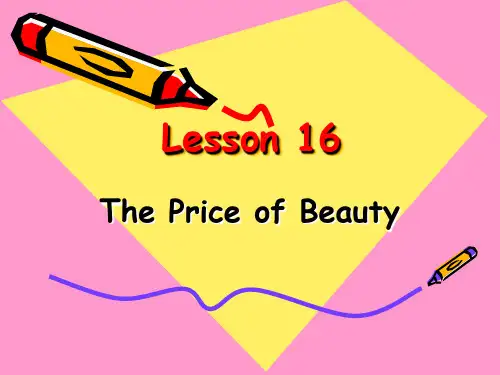
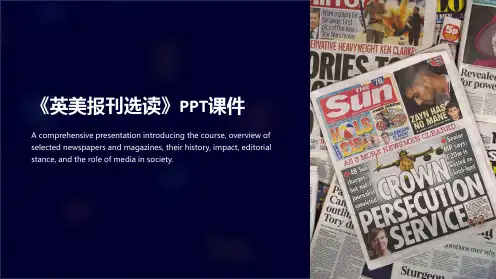
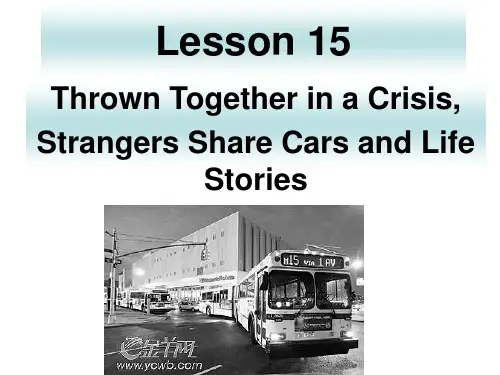
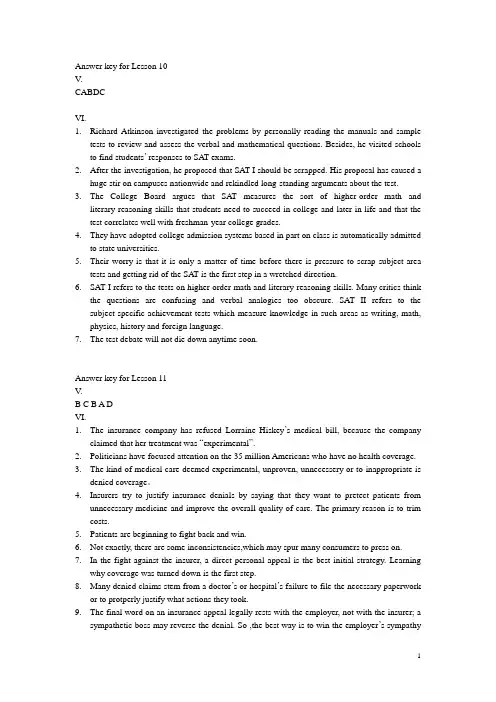
Answer key for Lesson 10V.CABDCVI.1.Richard Atkinson investigated the problems by personally reading the manuals and sampletests to review and assess the verbal and mathematical questions. Besides, he visited schools to find students’ responses to SAT exams.2.After the investigation, he proposed that SAT I should be scrapped. His proposal has caused ahuge stir on campuses nationwide and rekindled long-standing arguments about the test.3.The College Board argues that SAT measures the sort of higher-order math andliterary-reasoning skills that students need to succeed in college and later in life and that the test correlates well with freshman-year college grades.4.They have adopted college admission systems based in part on class is automatically admittedto state universities.5.Their worry is that it is only a matter of time before there is pressure to scrap subject-areatests and getting rid of the SAT is the first step in a wretched direction.6.SAT I refers to the tests on higher-order math and literary-reasoning skills. Many critics thinkthe questions are confusing and verbal analogies too obscure. SAT II refers to the subject-specific achievement tests which measure knowledge in such areas as writing, math, physics, history and foreign language.7.The test debate will not die down anytime soon.Answer key for Lesson 11V.B C B A DVI.1.The insurance company has refused Lorraine Hiskey’s medical bill, because the companyclaimed that her treatment was “experimental”.2.Politicians have focused attention on the 35 million Americans who have no health coverage.3.The kind of medical care deemed experimental, unproven, unnecessery or to inappropriate isdenied coverage。
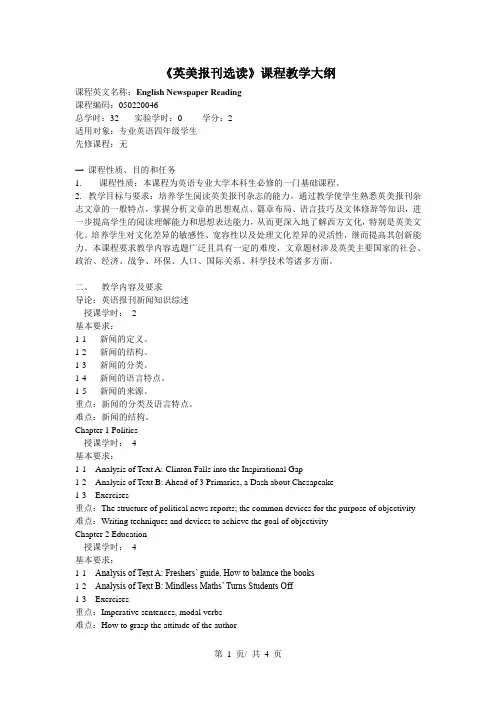
《英美报刊选读》课程教学大纲课程英文名称:English Newspaper Reading课程编码:050220046总学时:32 实验学时:0 学分:2适用对象:专业英语四年级学生先修课程:无一课程性质、目的和任务1. 课程性质:本课程为英语专业大学本科生必修的一门基础课程。
2. 教学目标与要求:培养学生阅读英美报刊杂志的能力。
通过教学使学生熟悉英美报刊杂志文章的一般特点,掌握分析文章的思想观点、篇章布局、语言技巧及文体修辞等知识,进一步提高学生的阅读理解能力和思想表达能力,从而更深入地了解西方文化,特别是英美文化。
培养学生对文化差异的敏感性、宽容性以及处理文化差异的灵活性,继而提高其创新能力。
本课程要求教学内容选题广泛且具有一定的难度,文章题材涉及英美主要国家的社会、政治、经济、战争、环保、人口、国际关系、科学技术等诸多方面。
二、教学内容及要求导论:英语报刊新闻知识综述授课学时:2基本要求:1-1 新闻的定义。
1-2 新闻的结构。
1-3 新闻的分类。
1-4 新闻的语言特点。
1-5 新闻的来源。
重点:新闻的分类及语言特点。
难点:新闻的结构。
Chapter 1 Politics授课学时:4基本要求:1-1 Analysis of Text A: Clinton Falls into the Inspirational Gap1-2 Analysis of Text B: Ahead of 3 Primaries, a Dash about Chesapeake1-3 Exercises重点:The structure of political news reports; the common devices for the purpose of objectivity 难点:Writing techniques and devices to achieve the goal of objectivityChapter 2 Education授课学时:4基本要求:1-1 Analysis of Text A: Freshers’ guide, How to balance the books1-2 Analysis of Text B: Mindless Maths’ Turns Students Off1-3 Exercises重点:Imperative sentences, modal verbs难点:How to grasp the attitude of the authorChapter 3 Science and Technology授课学时:4基本要求:1-1 Analysis of Text A: Nicholas Wade1-2 Analysis of Text B: Ben Webster1-3 Exercises重点:How to write the lead paragraph of news report, how to express different attitudes难点:Grasp the common pattern of technical articles: Description-Response-Evaluation Chapter 4 Economy授课学时:4基本要求:1-1 Analysis of Text A: The leading crisis as crack epidemic1-2 Analysis of Text B: No sympathy for jobless bankers1-3 Exercises重点:Analysis of “high status” and “low status” source, individual or institutional source难点:How to find clues in articlesChapter 5 Sports授课学时:4基本要求:1-1 Analysis of Text A: Spectacular opening ceremony kicks off Beijing Olympic Games1-2 Analysis of Text B: All eyes on opening ceremony of Beijing Olympics1-3 Exercises重点:Common writing sequence in sports news, e.g. Chronological order; functions of pictures enclosed难点:How to write coherentlyChapter 6 Law授课学时:4基本要求:1-1 Analysis of Text: Laws limit options when a student is mentally ill1-2 Exercises重点:How to propose and ground an argument in an exposition, e.g. figures, instances, and quotations难点:Linguistic devices on legal issues for the sake of objectivity, how to unveil the writer’s implied attitudeChapter 7 Disasters授课学时:4基本要求:1-1 Analysis of Text A: At least 8,600 people are killed in China earthquake1-2 Analysis of Text B: Bridges collapse in Minneapolis kills at least 71-3 Exercises重点:The evaluation function of news report, general structure of disaster reports: description, response and consequence难点:The evaluation function of news reportChapter 8 Comments and Opinions授课学时:4基本要求:1-1 Analysis of Text A: “9.11” investigation report discloses inside stories1-2 Exercises重点:Features of comments and opinions; writing devices including direct quotes, indirect reporting, intensifying addictives and adverbs, model verbs难点:Features of comments and opinions;Chapter 9 Approaches to attitudes in English news texts授课学时:4基本要求:1-1 Analysis of Text A: Virginia Tech gunman ‘worked alone’1-2 Exercises重点:Definition and classification of attitude, the features and sources of attitude, ways of how to approach attitude难点:How to construct a piece of news meaningfullyChapter 10 Approaches to the Texture of English News Texts授课学时:4基本要求:1-1 Analysis of Text A: Simpson Guilty in Robbery Trial1-2 Exercises重点:Understanding of writing devices including texture, conjunction, identification and periodicity难点:Text types, types of text structure三、学时分配四、推荐教材及参考书教材:《英语报刊选读》王振华主编高等教育出版社2009年参考书:《英美报刊文章阅读》周学艺主编北京大学出版社2008年《英汉英美报刊词典》周学艺主编外语教学与研究出版社2002年《英文报刊导读》马建国主编外语教学与研究出版社2002《报刊英语》苗普敬主编河南大学出版社2003年《报刊英语研究》张健主编上海外语教育出版社2006年五、课程考核课程成绩中期末考试成绩占70%,平时成绩占30%。
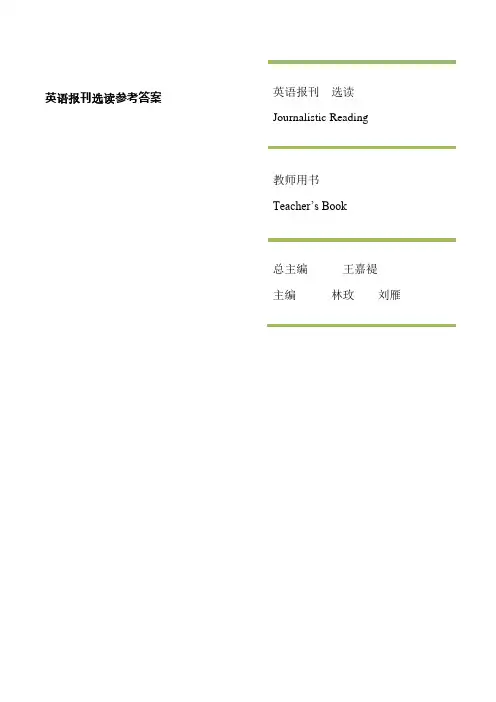
英语报刊选读参考答案英语报刊选读Journalistic Reading教师用书Teacher’s Book总主编王嘉褆主编林玫刘雁BOOK ONE (2)UNIT 1 Campus (2)UNIT 2 Entertainment (5)UNIT 3 Entertainment (9)UNIT 4 Food (12)UNIT 5 Crime (15)UNIT 6 Disaster (19)UNIT 7 Sports (23)UNIT 8 Art (28)UNIT 9 Economy (31)UNIT 10 Ecology (36)UNIT 11 Health (39)UNIT12 Automobile & Driving (43)UNIT 13 Quality problems (48)UNIT 14 Shopping (52)UNIT 15 Gun control (56)UNIT 16 Psychology (59)BOOK ONEUNIT 1 CampusI.Vocabulary Builder1.Definition1)chaotic: extremely disorganized; badly organized; be in mess2)primary: main; most important; key; major; chief; prime; principal3)seduce: attract; tempt4)highlight: the most important, interesting, or enjoyable part ofsomething such as a holiday, performance, or sports competition5)reluctant: unwilling6)compelling: very interesting or exciting, so that you have to payattention7)reveal: show; indicate8)mainstream: accepted by or involving most people in a society;normal; ordinary9)critical: important; crucial10)evolution: a long, gradual process during which something developsand changes, usually becoming more advanced; a gradual change and development2. Terms translation1) a bipartisan consensus2)high school diploma3)drop-out rate4)college wage premium5)the K-12 system6)more academically rigorous7)well-rounded citizens8)certification tests9)career and technical education3. Blank filling1) persevered 2) persisted 3) insisted 4) insisted 5) persevere6) agony 7) adversity 8) torment 9) plight 10) assure/reassure11) insure/ensure 12) insure 13) insure/ensure 14) assured/reassuredII.Translation1.选择圣路易斯的华盛顿大学是个不错的决定,但真正让我享受到理想大学生活的,(不是大学本身)是我到了大学后作的一些决定。
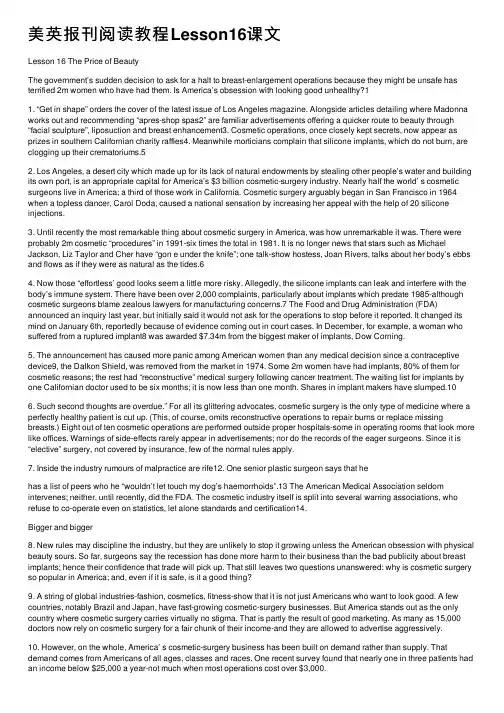
美英报刊阅读教程Lesson16课⽂Lesson 16 The Price of BeautyThe government’s sudden decision to ask for a halt to breast-enlargement operations because they might be unsafe has terrified 2m women who have had them. Is America’s obsession with looking good unhealthy?11. “Get in shape” orders the cover of the latest issue of Los Angeles magazine. Alongside articles detailing where Madonna works out and recommending “apres-shop spas2” are familiar advertisements offering a quicker route to beauty through “facial sculpture”, liposuction and breast enhancement3. Cosmetic operations, once closely kept secrets, now appear as prizes in southern Californian charity raffles4. Meanwhile morticians complain that silicone implants, which do not burn, are clogging up their crematoriums.52. Los Angeles, a desert city which made up for its lack of natural endowments by stealing other people’s water and building its own port, is an appropriate capital for America’s $3 billion cosmetic-surgery industry. Nearly half the world’ s cosmetic surgeons live in America; a third of those work in California. Cosmetic surgery arguably began in San Francisco in 1964 when a topless dancer, Carol Doda, caused a national sensation by increasing her appeal with the help of 20 silicone injections.3. Until recently the most remarkable thing about cosmetic surgery in America, was how unremarkable it was. There were probably 2m cosmetic “procedures” in 1991-six times the total in 1981. It is no longer news that stars such as Michael Jackson, Liz Taylor and Cher have “gon e under the knife”; one talk-show hostess, Joan Rivers, talks about her body’s ebbs and flows as if they were as natural as the tides.64. Now those “effortless’ good looks seem a little more risky. Allegedly, the silicone implants can leak and interfere with the body’s immune system. There have been over 2,000 complaints, particularly about implants which predate 1985-although cosmetic surgeons blame zealous lawyers for manufacturing concerns.7 The Food and Drug Administration (FDA) announced an inquiry last year, but initially said it would not ask for the operations to stop before it reported. It changed its mind on January 6th, reportedly because of evidence coming out in court cases. In December, for example, a woman who suffered from a ruptured implant8 was awarded $7.34m from the biggest maker of implants, Dow Corning.5. The announcement has caused more panic among American women than any medical decision since a contraceptive device9, the Dalkon Shield, was removed from the market in 1974. Some 2m women have had implants, 80% of them for cosmetic reasons; the rest had “reconstructive” medical surgery following cancer treatment. The waiting list for implants by one Californian doctor used to be six months; it is now less than one month. Shares in implant makers have slumped.106. Such second thoughts are overdue.” For all its glittering advocates, cosmetic surgery is the only type of medicine where a perfectly healthy patient is cut up. (This, of course, omits reconstructive operations to repair burns or replace missing breasts.) Eight out of ten cosmetic operations are performed outside proper hospitals-some in operating rooms that look more like offices. Warnings of side-effects rarely appear in advertisements; nor do the records of the eager surgeons. Since it is “elective” surgery, not covered by insurance, few of the normal rules apply.7. Inside the industry rumours of malpractice are rife12. One senior plastic surgeon says that hehas a list of peers who he “wouldn’t let touch my dog’s haemorrhoids”.13 The American Medical Association seldom intervenes; neither, until recently, did the FDA. The cosmetic industry itself is split into several warring associations, who refuse to co-operate even on statistics, let alone standards and certification14.Bigger and bigger8. New rules may discipline the industry, but they are unlikely to stop it growing unless the American obsession with physical beauty sours. So far, surgeons say the recession has done more harm to their business than the bad publicity about breast implants; hence their confidence that trade will pick up. That still leaves two questions unanswered: why is cosmetic surgery so popular in America; and, even if it is safe, is it a good thing?9. A string of global industries-fashion, cosmetics, fitness-show that it is not just Americans who want to look good. A few countries, notably Brazil and Japan, have fast-growing cosmetic-surgery businesses. But America stands out as the only country where cosmetic surgery carries virtually no stigma. That is partly the result of good marketing. As many as 15,000 doctors now rely on cosmetic surgery for a fair chunk of their income-and they are allowed to advertise aggressively.10. However, on the whole, America’ s cosmetic-surgery business has been built on demand rather than supply. That demand comes from Americans of all ages, classes and races. One recent survey found that nearly one in three patients had an income below $25,000 a year-not much when most operations cost over $3,000.11. According to the American Academy of Cosmetic Surgery, breast enlargement, which costs between $2,000 and $4,000, was only the tenth most popular cosmetic procedure in 1990. Topping the wish list was sclerotherapy (the removal of spider veins15 in the legs), followed by collagen injections to get rid of facial lines, then nose-jobs, lip-jobs and liposuction (fat removal). But among clients of the rival American Society of Plastic and Reconstructive Surgeons, breast enlargement, collagen injections and eyelid surgery were roughly equal as the three most popular operations.12. When pushed to defend their trade, cosmetic surgeons argue that “vanity surgery” is often just an extension of reconstructive surgery. For example, redesigning the nose of a young boy, perpetually :eased because of his prominent conk16, can turn a problem teenager into a well-adjusted man. Cosmetic survey follows two great American traditions: a refusal to surrender to an environment and a willingness to give people a second chance. What is the difference, some ask, between removing excess fat in an hour on the operating table and three months in the gym? “I don’t intend to grow old gracefully,17” says a woman in a television advertisement for an ambitious skin cream, “I intend to fight it every step of the way.”13. Many, however, admit that there is a darker side. Psychologists point out that many operations are not to get rid of deformity18, but to make perfectly good looks even better. The Los Angeles Times recently reported that the beginning of the swimsuit season prompts a rush of breast implants; school reunions are good for the face-lift business.Growing old gracelessly14. Such competitive narcissism19 stretches into employment too. Larry Schoenrock of the University of California at San Francisco points out that good-looking people are more likely to get jobs. Most are women aiming to please prospective male bosses; but many male patients citetheir careers as the chief reason for going under the scalpel20.15. For ethnic minorities, the most popular operations are ones that change their racial characteristics. Asians want wider eyes; blacks want thinner lips. Critics say this is surrendering their identities to the white stereotypes that appear on the media. Surgeons say the point is more subtle: minorities want to de-emphasise rather than eradicate their looks21. For example, one Californian surgeon says that many blacks specifically ask that, after their operations, they should not look like Michael Jackson, who now has a “white” nose and “white” skin.16. Some trend-spotters22 detect the beginnings of a reaction against the knife. Non-surgical methods to reduce wrinkles, such as electronic massage machines, are selling fast. Last year the number of face-lifts completed increased by less than 1%. Cosmetic surgery can only hold back age; it cannot defeat it.23 Mr. Jackson, who has been described as the PeterPan24 of the music industry, might reflect on Maurice Chevalier’s sanguine attitude25 to the appearance of a few wrinkles. “I prefer old age to the alternative,” he said.From The Economist, January llth, 1992。
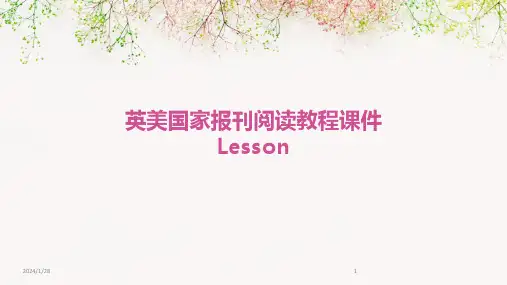
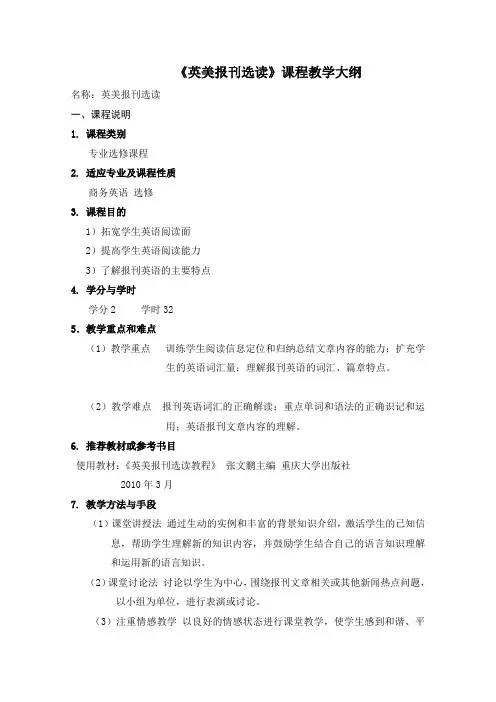
《英美报刊选读》课程教学大纲名称:英美报刊选读一、课程说明1. 课程类别专业选修课程2. 适应专业及课程性质商务英语选修3. 课程目的1)拓宽学生英语阅读面2)提高学生英语阅读能力3)了解报刊英语的主要特点4. 学分与学时学分2 学时325.教学重点和难点(1)教学重点训练学生阅读信息定位和归纳总结文章内容的能力;扩充学生的英语词汇量;理解报刊英语的词汇、篇章特点。
(2)教学难点报刊英语词汇的正确解读;重点单词和语法的正确识记和运用;英语报刊文章内容的理解。
6. 推荐教材或参考书目使用教材:《英美报刊选读教程》张文鹏主编重庆大学出版社2010年3月7. 教学方法与手段(1)课堂讲授法通过生动的实例和丰富的背景知识介绍,激活学生的已知信息,帮助学生理解新的知识内容,并鼓励学生结合自己的语言知识理解和运用新的语言知识。
(2)课堂讨论法讨论以学生为中心,围绕报刊文章相关或其他新闻热点问题,以小组为单位,进行表演或讨论。
(3)注重情感教学以良好的情感状态进行课堂教学,使学生感到和谐、平等和友善的课堂氛围,激发学生积极向上的情绪。
(4)任务教学法将学生分成2人一组,收集4条最近的新闻并制作成图文并茂的PPT,向全班同学进行新闻播报展示。
8. 考核及成绩评定考核方式:考查成绩评定:(1)平时成绩占x%,包括平出勤、听课状态和作业完成情况。
(2)新闻PPT展示成绩占x%(3)新闻读书报告成绩占x%9. 课外自学要求(1)到网上查找相关的资料进一步理解课堂难点问题,或扩充课堂内容的相关背景知识。
(2)认真并及时完成课后作业。
(3)及时预习课文内容课程进度表二、课程进度安排本课程计划32学时,课程主要内容和学时分配见课程进度表。
制定人:审核人:。
英美报刊选读_课文word整合版Unit2 Gender IssuesMen turn to jobs women usually do 1.HOUSTON - Over the last decade, Americanmen of all backgrounds have begun flocking to fields such as teaching, nursing and waiting tables that have long been the province of women.2."The way I look at it is that anything, basically,that a woman can do, a guy can do," said Miguel Alquicira, who graduated from high school when construction and manufacturing jobs were scarce and became a dental assistant.3.The trend began well before the crash,andappears to be driven by a variety of factors, including financial concerns, quality-of-life issues and a gradual erosion ofg ender stereotypes.4.In interviews, about two dozen men played downthe economic considerations, saying that the stigma associated with choosing such jobs had faded, and that the jobs were appealing not just because they offered stable employment, but because they were more satisfying.5."I.T. is just killing viruses and clearing paperjams all day," said Scott Kearney, 43, who tried information technology and other fields before becoming a nurse in the pediatric intensive care unit at Children's Memorial Hermann Hospital in Houston.6.An analysis of United States census data by TheNew York Times shows that from 2000 to 2010, occupations that are more than 70 percent female accounted for almost a third of all job growth for men, double the share of the previousdecade. 7.That does not mean that men are displacing women - those same jobs accounted for almost two-thirds of women's job growth. But in Texas, for example, the number of men who are registered nurses nearly doubled in that time period.8.The shift includes low-wage jobs as well.Nationally, two-thirds more men were bank tellers, almost twice as many were receptionists and two-thirds more were waiting tables in 2010 than a decade earlier.9.Even more striking is the type of men who aremaking the shift. From 1970 to 1990, according to a study by Mary Gatta, senior scholar at Wider Opportunities for Women, an organization based in Washington, D.C., and Patricia A. Roos, a sociologist at Rutgers University in New Jersey, men who took so-called pink-collar jobs tended to be foreign-born, non-English speakers with low education levels.10.Now, though, the trend has spread among men ofnearly all races and ages, more than a third of whom have a college degree. In fact, the shift is most pronounced among young, white, college-educated men like Charles Reed, a sixth-grade math teacher at Patrick Henry Middle School in Houston.11.Mr. Reed, 25, intended to go to law school after atwo-year stint with Teach for America, a national teacher corps of recent college graduates who spend two years helping under-resourced urban and rural public schools. But Mr. Reed fell in love with teaching. He says the recession had little to do with it, though he believes that, by limiting prospects for new law school graduates, it made his father, a lawyer, more accepting.12.To the extent that the shift to "women's work"has been accelerated by recession, the change may reversewhen the economy recovers. "Are boys today saying, 'I want to grow up and be a nurse?'" asked Heather Boushey, senior economist at the Center for American Progress."Or are they saying, 'I want a job that's stable and recession-proof?'"13.Daniel Wilden, a 26-year-old Army veteran andnursing student, said he had gained respect for nursing when he saw a female medic use a Leatherman tool to save the life of his comrade."She was a beast," he said admiringly.14.More than a few men said their new jobs werefar harder than they imagined. But these men can expect success. Men earn more than women even in female-dominated jobs. And white men in particular who enter those fields easily move up to supervisory positions, a phenomenon known as the glass escalator, said Adia Harvey Wingfield, a sociologist at Georgia State University.15."I hated my job every single day of my life," saidJohn Cook, 55, who got a modest inheritance that let him drop a $150,000-a-year database consultant's job to enter nursing school. 16.His starting salary will be two thirds lower, but database consulting does not typically earn hugs like the one Mr. Cook received from a girl after he took care of her premature baby sister. "It's like, people get paid for doing this kind of stuff?"Mr. Cook said, tears coming to his eyes as he recounted the episode.17.Several men cited the same reasons for seekingout pink-collar work that have drawn women to such careers: less stress and more time at home.At John G. Osborne Elementary School, Adrian Ortiz, 42,joked that he was one of the few Mexicans who made more in his native country, where he was a hard-working lawyer, than he did in the United States as a kindergarten teacher in a bilingual classroom. "Now," he said, "my priorities are family, 100 percent."18.Betsey Stevenson, a labor economist at theUniversity of Pennsylvania, said she was not surprised that changing gender roles at home, where studies show men are shouldering more of the domestic burden, are showing up in career choices. "We tend to study these patterns of what's going on in the family and what's going on in the workplace as separate, but they're very much intertwined," she said. "So as attitudes in the family change, attitudes toward the workplace have changed."19.In a classroom at Houston Community College,Dexter Rodriguez, 35, said his job in tech support had not been threatened by the tough economy. Nonetheless, he said, his family downsized the house, traded the new cars for used ones and began to live off savings, all so Mr.Rodriguez could train for a career he regarded as more exciting.20."I put myself into the recession," he said,"because I wanted to go to nursing school."Unit3 E-CommerceThe Post-Cash Economy1.In London, travelers can buy train tickets withtheir phones - and hold up the phones for the conductor to see. And in Starbucks coffee shops in the United States, customers can wave their phones in front of the cash register and pay for their soy chai lattes.2.Money is not what it used to be, thanks to theInternet. And the pocketbook may soon be destined for the dustbin of history - at least if some technology companies get their way.3.The cellphone increasingly contains theessentials of what we need to make transactions."Identification, payment and personal items," as Hal Varian, the chief economist at Google, pointed out in a new survey conducted by the Pew Research Center in Washington, D.C. "All this will easily fit in your mobile device and will inevitably do so."4.The phone holds and records plenty more vitalinformation: It keeps track of where you are, what you like and who your peers are. That data can all be leveraged to sell you things you never knew you needed.5.The survey, released last month by the PewResearch Center's Internet and American Life Project along with Elon University's Imagining the Internet Center in North Carolina, asked justover 1,000 technologists and social scientists to opine on the future of the wallet in 2020. Nearly two-thirds agreed that "cash and credit cards will have mostly disappeared" and been replaced with "smart" devices able to carry out a transaction.But a third of the survey respondents countered that consumers would fear for the security of transactions over a mobile device and worry about surrendering so much data about their purchasing habits.6.Sometimes, those with fewer options are theones to embrace change the fastest. In Kenya, a service called M-Pesa (pesa is money in Swahili) acts like a banking system for those who may not have a bank account. With a rudimentary cellphone, M-Pesa users can send and receivemoney through a network of money agents, including cellphone shops. And in India, several phone carriers allow their customers to pay utility bills and transfer small amounts of money over their cellphones.7.Several technology companies, big and small,are busy trying to make it easier for us to buy and sell all kinds of things without our wallets. A start-up,WePay, describes itself as a service that allows the smallest merchant - say, a dog walker - to get paid; the company verifies the reputations of payers and sellers by analyzing, among other things, their Facebook accounts. 8. A British start-up, called Blockchain, offers afree iPhone application allowing customers to use a crypto-currency called bitcoins, which users can mint on their computers.9. A company called Square began by offering asmall accessory to enable food cart vendors and other small merchants to accept credit cards on phones and iPads. Square's latest invention allows customers to register an account with Square merchants and pay simply by saying their names. The customer's picture pops up on the merchant's iPad.10.Google Wallet has been designed to sit in yourphone, be linked to your credit card, and let you pay by tapping your phone on a reader, using what is known as near field technology.But Google Wallet works on only four kinds of phones, and not many merchants are equipped for near field technology.11.Meanwhile, PayPal, which allows people tomake payments over the Internet, has quietly begun to persuade its users to turn to their cellphones. PayPal posted about $118 billion in total transactions last year and became thefastest-growing segment of eBay, its parent company.12."The physical wallet, which had no innovationin the last 50 years, will become an artifact,"John J. Donahoe, the chief executive of eBay, told me recently. The wallet would move into the cloud, and ideally, from his perspective, into PayPal. No more would the consumer worry about losing a wallet. Everything, he declared, would be contained within PayPal. It would also enable the company to collect vast amounts of data about customer habits, purchases and budgets.13.Mr. Donahoe said he wanted his company to become "a mall in your pocket."14.I recently described PayPal's plans to AlessandroAcquisti, an economist who studies digital privacy at Carnegie Mellon University in Pittsburgh. Mr. Acquisti smiled. If today all you need to do is enter your phone number and PIN when you visit a store, perhaps tomorrow, he said, that store will be able to detect your phone by its unique identifier. Perhaps, you won't have to shop at all. Your shopping data would be instead collected, analyzed and used to tell you exactly what you need: a motorcycle from Ducati or purple rain boots in the next size for your growing child. Money will be seamlessly taken from your account. A delivery will arrive at your doorstep. "In the future, maybe you won't have to pay," Mr. Acquisti offered, only half in jest."The transaction will be made for you."Unit4Cultural ExchangeAsia’s Endangered Species: the Expat1.Forget expats. Western companies doingbusiness in Asia are now looking to locals to fill the most important jobs in the region.2.Behind the switch, experts say, are severalfactors, including a leveled playing field in which Western companies must approach newly empowered Asian companies and consumers as equals and clients—not just manufacturing partners./doc/2216449449.html,panies now want executives who can securedeals with local businesses and governments without the aid of a translator, and who understand that sitting through a three-hour dinner banquet is often a key part of the negotiating process in Asia, experts say.4.In fact, three out of four senior executives hiredin Asia by multinationals were Asian natives already living in the region, according to a Spencer Stuart analysis of 1,500 placements made from 2005 to 2010. Just 6% were noncitizens from outside of Asia.5."It's a strategic necessity to be integrated in theculture. Otherwise, the time to learn all of it takes forever," said Arie Y. Lewin, a professor of strategy and international business at Duke University's Fuqua School of Business. He adds that locals may better navigate a business culture where copycats and competitors often play bydifferent rules.6.What's more, a failed expatriate hire can be acostly mistake and slow a firm's progress in the region, said Phil Johnston, a managing director at recruiter Spencer Stuart.7.To help companies fill Asia-based executiveroles, at least two search firms—Spencer Stuart and Korn/Ferry International—say they have begun classifying executives in four broad categories: Asia natives steeped in localculture but educated in the U.S. or Europe; the foreigner who has lived or worked in Asia for a long time;a person of Asian descent who was born orraised in a Western country but has had little exposure to Asia; and the local Asian executive who has no Western experience.8.For companies seeking local expertise, bothfirms said the first category is by far the mostsought-after. But Mr. Johnston said those candidates are difficult to find and retain, and they can command salaries of $750,000 to $1 million—on par with, and sometimes more than, their expat counterparts.9.German conglomerate Siemens AG in 2010hired Mei-Wei Cheng, a China-born Cornell University graduate, to head its Chinese operations—a role previously held by European executives.10.While Siemens's European executives had madeinroads with Chinese consumers—building sales in the region to nearly one-tenth of global revenue—the firm realized it needed someone who could quickly tap local business partners.11.After an extensive search, Siemens hired Mr.Cheng, formerly CEO at the Chinese subsidiaries of Ford Motor Co. and General Electric Co. GE12.The decision to hire locally seems to have paidoff for Siemens: In his first 18 months on the job, Mr. Cheng forged two wind-power jointventures with Shanghai Electric Group Co.13.Mr. Cheng communicates easily with localofficials, a major advantage when it comes to selling energy technology to individual cities, says Brigitte Ederer, head ofhuman resources for Siemens and a member of the company's managing board. Many local officials don't speak English.14.Bob Damon, president of recruiter Korn/FerryInternational's North American operations, said the current talent pool for executive roles is so limited that most top Asian executives simply rotate from one Western company to another, as Mr. Cheng did.15.Other companies are adding to the demand bycreating new positions in Asia.Campbell Soup Co. CPB last week announced the appointmentof Daniel Saw as its first-ever president of Asia operations, while Canadian conglomerate Bombardier Inc. BBD.B.T hired Albert Li to filla new role overseeing its aerospace business inChina. Both executives were born in Asia and have worked as regional managers for Western multinationals.16.Meanwhile, younger Chinese professionals arepositioning themselves to meet the need for executive talent in the years to come. Nearly four in 10 American M.B.A. programs say China was their fastest-growing source of foreign applicants last year, according to the Graduate Management Admission Council, which administers the Graduate Management Admission Test.17.Foreigners with no Asia experience, on the otherhand, need not apply, recruiters said. Spencer Stuart's Mr. Johnston said he occasionally receives inquiries from Western middle managers, proclaiming that they are finally ready to make a career move to the region. He advises them that "there is nothing about their experience that is interesting or relevant to Asia."18.In hubs like Singapore and Hong Kong, expatsreceive as much as $200,000 a year in subsidies for housing, transportation and private schooling, Mr. Johnston said. Payments to offset taxes for these benefits add up to another $100,000.Altogether, a bad match can cost a company as much as $1 million, after figuring in relocation costs, he said.19.Monster Worldwide Inc. Chief Executive SalIannuzzi said the company has been hiring locally for several years, in part because he found deploying expatriates cost too much. "Ittakes them six months to figure out how to take a ferry, they're there for 12 months, and then they spend the next six months figuring out how to get home," he said.20.Like some other companies, Monster now tracksits own workers to ensure a pipeline of talent. 21.The online job-search company's current head ofChina operations, Edward Lo, a former fraternity brother of Mr. Iannuzzi, understands the local scene, is well connected in China and knows how to recruit, Mr. Iannuzzi said.Among Mr. Lo's duties: finding his own successor before he retires.22.Starwood Hotels & Resorts Worldwide Inc.based in White Plains, N.Y., also develops its own leaders for Asia, plucking people who have come up through the company ranks. For example, the head of Asia Pacific started in the 1970s on the finance team in Hong Kong, and the head of the Middle East region was a hotel manager who worked his way up.23.Having grown up in their markets, managersunderstand customer needs, said Starwood CEO Frits van Paasschen. Regional heads in China, for instance, know that whendealing with land owners or developers, deals are less "transactional," and more "trust-based," he said.They also know that Chinese travelers—who now comprise the majority of hotel guests in the region—feel more at home when they're supplied with tea kettles, slippers and chopsticks, headded.24.For fast-food company Yum Brands Inc. CEODavid Novak calls his Asia-bred regional head and executive team "our single biggest competitive advantage." China has become the company's biggest earnings driver, comprising more than 40% of operating profit.25.Thanks to Yum's China leaders, Mr. Novak says,KFC in China began serving rice porridge and soy milk for breakfast, and Pizza Hut now offers an afternoon tea menu—both of which have been big hits among local customers.Unit5Auto-WorldThe Future of the Car :Clean, Safe and it Drives itselfCars have already changed the way we live. They are likely to do so again1.SOME inventions, like some species, seem tomake periodic leaps in progress. The car is one of them. Twenty-five years elapsed between Karl Benz beginning small-scale production of his original Motorwagen and the breakthrough, by Henry Ford and his engineers in 1913, that turned the car into the ubiquitous, mass-market item that has defined the modern urban landscape. By putting production of the Model T on moving assembly lines set into the floor of his factory in Detroit, Ford drastically cut the time needed to build it, and hence its cost. Thus begana revolution in personal mobility. Almost abillion cars now roll along the world’s highways.2.Today the car seems poised for another burst ofevolution. One way in which it is changing relates to its emissions. As emerging markets grow richer, legions of new consumers are clamouring for their first set of wheels. For the whole world to catch up with American levels of car ownership, the global fleet would have to quadruple. Even a fraction of that growth would present fearsome challenges, from congestion and the price of fuel to pollution and global warming.3.Yet, as our special report this week argues,stricter regulations and smarter technology are making cars cleaner, more fuel-efficient and safer than ever before. China, its cities choked in smog, is following Europe in imposing curbs on emissions of noxious nitrogen oxides and fine soot particles. Regulators in most big car marketsare demanding deep cuts in the carbon dioxide emitted from car exhausts. And carmakers are being remarkably inventive in finding ways to comply.4.Granted, battery-powered cars have disappointed.They remain expensive, lack range and are sometimes dirtier than they look—for example, if they run on electricity from coal-fired power stations. But car companies are investing heavily in other clean technologies. Future motorists will have a widening choice of super-efficient petrol and diesel cars, hybrids (which switch between batteries and an internal-combustion engine) and models that run on natural gas or hydrogen. As for the purely electric car, its time will doubtless come.Towards the driverless, near-crashless car 5.Meanwhile, a variety of ―driver assistance‖technologies are appearing on new cars, which will not only take a lot of the stress out of driving in traffic but also prevent many accidents. More and more new cars can reverse-park, read traffic signs, maintain a safe distance in steady traffic and brake automatically to avoid crashes. Some carmakers are promising technology that detects pedestrians and cyclists, again overruling the driver and stopping the vehicle before it hits them.A number of firms, including Google, are busy trying to take driver assistance to its logical conclusion by creating cars that drive themselves to a chosen destination without a human at the controls. This is where it gets exciting.6.Sergey Brin, a co-founder of Google, predictsthat driverless cars will be ready for sale tocustomers within five years. That may be optimistic, but the prototypes that Google already uses to ferry its staff (and a recent visitor from The Economist) along Californian freeways are impressive. Google is seeking to offer the world a driverless car built from scratch, but it is more likely to evolve, and be accepted by drivers, in stages.7.As sensors and assisted-driving softwaredemonstrate their ability to cut accidents, regulators will move to make them compulsory for all new cars. Insurers are already pressing motorists to accept black boxes that measure how carefully they drive: these will provide a mass of data which is likely to show that putting the car on autopilot is often safer than driving it.Computers never drive drunk or while texting. 8.If and when cars go completely driverless—forthose who want this—the benefits will be enormous. Google gave a taste by putting a blind man in a prototype and filminghim being driven off to buy takeaway tacos. Huge numbers of elderly and disabled people could regain their personal mobility. The young will not have to pay crippling motor insurance, because their reckless hands and feet will no longer touch the wheel or the accelerator. The colossal toll of deaths and injuries from road accidents—1.2m killed a year worldwide, and 2m hospital visits a year in America alone—should tumble down, along with the costs to health systems and insurers.9.Driverless cars should also ease congestion andsave fuel. Computers brake faster than humans.And they can sense when cars ahead of them are braking. So driverless cars will be able to drive much closer to each other than humans safely can. On motorways they could formfuel-efficient ―road trains‖, gliding along in the slipstream of the vehicle in front. People who commute by car will gain hours each day to work, rest or read a newspaper.Roadblocks ahead10.Some carmakers think this vision of the future is(as Henry Ford once said of history) bunk.People will be too terrified to hurtle down the motorway in a vehicle they do not control: computers crash, don’t t hey? Carmakers whose self-driving technology is implicated in accidents might face ruinously expensive lawsuits, and be put off continuing to develop it.11.Yet many people already travel, unwittingly, onplanes and trains that no longer need human drivers. As with those technologies, the shift towards driverless cars is taking place gradually.The cars’ software will learn the tricks that humans use to avoid hazards: for example, braking when a ball bounces into theroad, because a child may be chasing it. G oogle’s self-driving cars have already clocked up over 700,000km, more than many humans ever drive;and everything they learn will become available to every other car using the software. As for the liability issue, the law should be changed to make sure that when cases arise, the courts take into account the overall safety benefits of self-driving technology.12.If the notion that the driverless car is round thecorner sounds far-fetched, remember that TV and heavier-than-air flying machines once did, too.One day people may wonder why earlier generations ever entrusted machines as dangerous as cars to operators as fallible as humans.Unit6 RomanceThe Modern Matchmakers现代红娘Internet dating sites claim to have brought scienceto the age-old question of how to pair offsuccessfully. But have they?互联网相亲网站声称已经将科技运用如何成功配对的问题之上。
大学《英美报刊选读》单词汇总第一篇:大学《英美报刊选读》单词汇总一、单词(reading one)1、Part One: The NewspaperUnit OneInternational NewsCompounds n.大院,有围墙的房群Prostitution n.卖淫Nudity n.裸体,裸露Come-back n.卷土重来Erotica n.色情书、画Smut n.黄段子Racy adj.下流的,不雅的Crack-down n.打击Pornography n.淫秽,色情Venue n.场所Plugged-in adj.(喻)触网的Periodically adv.定期的Straight and narrow 正当、诚实、正派Deprave v.腐化,堕落Resurgence n.重新抬头Authoritarian adj.权威的Lovelorn adj.失恋的Strait-laced adj.一本正经的,古板的Law-breaker n.违法者Mores n.传统,习俗Obscene adj.淫秽的Loosen up 放松,松弛Censor v.检查,审查Air-waves n.无线电波Epidemic n.流行病Blush v.脸红Ubiquitous adj.无处不在Unit TwoNational Report Payout n.付出款项Mirror v.反映Slam v.猛力撞击Tailored adj.作过修改的;简单实用的Fuel v.刺激,激起Ward off 避开;避免Divisiveness n.分裂;不和;分歧Deflect v.转移,引开Statute n.法令Shackle v.束缚;阻挠Sentiments n.意见;观点Elude v.躲避;避开Flat-award n.固定赔偿金Forgo v.放弃Recipient n.接受者Enact v.制定或通过(法令)Sue v.提起诉讼Grieving adj.感到悲伤的Curtail v.削减Collateral adj.附带的Litigate v.诉讼Offset n.补偿Equitable adj.公平合理的Curb n.控制,约束Crippling adj.极有害的Defunct adj.不再使用的Waive v.放弃Magnitude n.规模Unit ThreeBusiness WorldInnovative adj.创新的,革新的File for 申请Oligarchy n.寡头政治,寡头统治集团Underwrite v.认购(公司)尚未出售的新股票;包销Cream n.精华,精粹Wrest v.夺取,费力取得Auction n.拍卖;标售Bypass v.绕过,越过Pull the strings 操纵事件或他人行为Bid for 出价Pull off(成功火箭哭地)完成,做成Batch n.一批,一组Tank v.储存,囤积Precedent n.先例,前例Treasury bond(美国财政部发行的)证券Synonym n.同义词Allocate v.分配,配给Oxycodone n.羟基二氢可待因酮Hedge fund 套利基金Hydrocodone n.二氢可待因酮Pension n.养老金,抚恤金,退休金 Amphetamine n.氨基丙本,安非他明(解除忧郁、疲劳的药)Skunk n.臭鼬Orchestrate v.使和谐地结合起来 Deficit n.不足,欠缺Merchandise n.商品,货品Hyperactivity n.极度活跃Sabotage v.破坏,阻挠Pharmaceutical adj.制药的,应用药物的Ardent adj.热心的,热情的Clout n.势力,影响力,权势Extract v.提取,榨出Garner v.积累,获得Monopoly n.垄断,独占Unit FourThe MetroLongevity n.长寿,长命Broccoli n.花椰菜,球花甘蓝Scary adj.易受惊的,胆怯的Bogeyman n.鬼怪,骇人的东西Impoverish v.使贫困Cater for 满足需求Dire adj.可怕的,不祥的Skim off 除去,(为逃税等而)瞒报Bail out v.帮助脱离困境Risk-pooling n.风险集中Unwarranted adj.无保证的,不确定的,不必要的Means testing 对(失业或残疾者等)进行经济情况调查(已确定是否给予补助)Laud v.赞美,称赞Rhetoric n.辞令,虚夸Discount with 不信,漠视Imminent adj.临近的,逼近的Demutualisation n.利化,互利改组公司(公司大部分股份转给雇员或主顾)Appreciably adv.可估计的,明显的Lurch v.突然倾斜,改变Terminology n.术语Fix n.补救方法,应急措施Wonk n.刻苦用功的学生Actuary n.保险精算师,保险业务计算员 Disincentive n.(对经济发展等)起抑制作用的,制止因素Odd adj.额外的,零星的Prone adj.容易的,易于Obesity n.肥胖,肥胖症Wholesale adj.大规模的,不加区别的Unit FiveScience & TechnologyStigma n.污名,耻辱Cellular n.蜂窝式分区无线,通讯Aplomb n.沉着,泰然Demographic adj.人口统计学的Missive n.信件Adroitness n.熟练Hunt and peck 看着键盘打字Manifest v.表明Boom v.繁荣,兴隆Dexterity n.灵巧,机敏Hierarchy n.层次,等级Piranha n.水虎鱼Digit n.手指Genera(pl of genus)n.类,属With the advent of 随着……的出现,到来Stature n.(凭才能和成就而获得的)声誉Ferocious adj.凶猛的Envision v.想象,预想Banishment n.流放,放逐Snag n.阻碍Renaissance n.复兴Banter n.善意的玩笑Prowess n.威力Tendon n.[解]腱Opportune adj.恰好的,适宜的Manifold adj.多方面的,多种形式的Unlearn v.忘却Callus n.老茧Foothold n.立足点Tough sth.Out 从(困难)中硬挺过来Unobtrusive adj.不明显的Unit SixArt & LivingMilk v.从……中获利,获益;从……中榨取Compliment n.敬意Playbook n.剧本Soundtrack n.(电影)配乐Embrace n.接受,利用Hit n.轰动一时的人物,风行一时的东西Nerve-wracking adj.使人心烦的,伤脑筋的Dicier adj.更冒险的,更危险的Console n.(计)控制台Format n.程序,格式Render v.致使,使成Rule of thumb 经验得来的法则Take a chance 碰运气,冒险Tie-in n.搭配在一起出售的货品Sure-fire adj.稳操胜券的Sequel n.续集,续篇Flail v.鞭打,抽打Shakeout n,(行情下跌中的盈利微薄行业、产品等的)被淘汰,裁汰Stave off 延缓,避开Hedge v.避免,防范Profligate adj.恣意的,极其浪费的 Cushion n.垫子,保护物,缓冲装置Ancillary adj.辅助的,从属的Rental n.租金收入,租金额Spin-off n.副产品,衍生产品Bomb v.(美俚)惨败Mark down 减价,降价Legitimate adj.合法的,正规的Rival v.与……竞争,对抗Scramble v.争取,争夺Subscription n.订约,订阅,订购Pitch v.努力推销Juggernaut n.使人盲目崇拜并为之牺牲的事物;不可抗拒的力量Model on 模仿,效仿Franchise n.特许权,特许经营权Flat-footed adj.无准备的Platinum n.铂,白金Keep one’s edge 保持优势Consolidation n.合并,联合Devour v.吞食Portfolio n.公事包,文件夹Conglomerate n.由许多公司组成的大公司,企业集团Unit SevenSports & FitnessTrivial adj.琐细的,微不足道的Referendum n.全民投票Kinesiology n.[体]运动机能学Obsolete adj.废弃的,过时的Oddity n.怪人,奇特的东西Hone v.磨练;训练Twitch n.急扯,猛地一拉Sprinter n.赛跑选手Grab hold of 抓紧,掌握Dystrophy n.营养不良Steroid n.类固醇Therapy n.治疗Rogue n.流氓;无赖Innate adj.先天的,天生的Paralympics n.伤残奥运会Profile n.侧面;轮廓;概况Bet n.预言Tendon n.[解]腱Deleterious adj.有害的,有毒的Anarchy n.无政府状态,混乱状态 Freak n.畸形或不正常的人或动物Be inundated sb.(with sth.)给予某人很多事情使之难以应付;是某人不胜负荷Unit EightFeaturesPonder v.考虑;深思Gelato n.意大利胶凝冰棍Vendor n.摊贩;卖主Rite n.隆重的仪式或典礼Siesta n.午后的小睡Villa n.带有大花园的别墅 Repeal v.废止(法规等)Calvinism n.加尔文主义 Dehumanize v.非人化Nurture v.培养;养育Eclipse v.使相形见绌;黯然失色Sloth n.树懒(动物)Frenetic adj.发狂的Fresco n.壁画Disentangle v.摆脱Enervate v.使(人)失去力量或精力Anomaly n.不合规则;异常事物Confluence n.汇合,汇集 Skip v.不参加,不做Ideology n.思想意思Take a toll/ take its toll of something 造成损失、毁坏等Unit NineEditorials & OpinionsUnprecedented adj.史无前例的,空前的Pitch n.程度Flip side 反面Loom v.隐现,迫近Swathes of 大片Fell v.砍伐Accentuate v.强调Endemic v.地方病Sanitation n.卫生设施Epidemic n.流行病Degradation n.退化,降级Sustainable adj.可持续的Patriarch n.家长Devolve v.(把权力、工作)移交某人Vested interest 特权Tip off 向……泄露,告诫Saga n.传奇Tributary n.支流T oxin n.[生]毒素Tannery n.制革厂Torrential adj.奔流的Mound n.土堆,土丘Chlorinate v.用氯消毒Stagnate adj.因不流动而变臭的或有味的Insatiable adj.不知足的,贪得无厌的Dioxin n.[化]二氧(杂)芑Levy n.征税Signatory n.签名者Legitimacy n.合法(性),合理(性)Hierarchy n.层次,等级Unit TenHealth & EnvironmentContagious adj.传染的,有传染性的 Obesity n.肥胖,过度肥胖Biotech n.应用生物Affiliate v.隶属,关联 Unravel v.揭开,弄清Leptin n.瘦体素基因Hormone n.荷尔蒙Calorie n.卡路里Mutation n.改变,突变Cholesterol n.胆固醇Triglyceride n.三酸甘油酯Adenovirus n.腺病毒Antibody n.抗体Counterpart n.对应体Lipoprotein n.脂蛋白Fringe adj.从属的,次要的,附加的Cutting-edge adj.最先进的,前沿的 Valid adj.有效的Shore v.支撑,稳住Pan(out)v.证明(是),结果(是)Groundbreaking adj.开天辟地的,创业的Ulcer n.溃疡2、Part Two: The MagazineStand on 坚持Be entitled to 有做某事的权利 Egotism n.自我中心,自私自利Rabble n.乱纷纷的人群,乌合之众Assent v.同意,赞成Dependant n.依赖他人生活着Metaphysical adj.形而上学的,抽象的Petitioner n.上诉人 Sphere n.领域,范围Bureaucrat n.贵族Dissatisfied adj.感到不满的,不满足的Complainant n.原告Adjudicator n.裁判,评论员 Doubly adv.加倍的,双重地Redress n.纠正,补偿Aggrieved adj.愤恨的,愤愤不平的Sap v.逐渐消耗Beneficiary n.受益者,受益人Entice v.诱惑,诱使Prohibition n.禁止,阻止Labyrinth n.迷宫,迷津Substantive adj.真实的,实在的,实际的Preclude v.排除Psychiatrically adv.精神病的 In vitro fertilization 体外受精Dire adj.可怕的Every other 所有其他的DoH(Department of Health)卫生部 Irrespective of 无论Bedlam n.疯人院Paralysis n.瘫痪Reverberation n.回响,反射Deterioration n.恶化Abstraction n.抽象概念 Connotation n.涵义Beloved adj.心爱的Inalienability n.不可剥夺Allegedly adv.据说,根据(人们)宣称Unconditional adj.无条件的Observance n.遵守Abrogate v.废止,取消Deem v.认为Ill-conduct n.不良行为Unassailable adj.不可攻破的Tangible adj.明确的,确切的,真实的Tower block 高层建筑,摩天大楼Dialectic adj.辩证关系Vaunted adj.吹嘘的,夸耀的 Ingratitude n.忘恩负义Feral adj.野性的Grievance n.牢骚,不满,怨恨Permissive adj.放任的,放纵的3、Part Three: News on the WebParalegal n.律师的专职助手Do over 重做,重复Internship n.实习,实践Counselor n.顾问,参谋 Tuition n.学费Exploration n.探索,探究 Fare v.进展,过日子Dissuade v.劝阻Contemplate v.打算,考虑Unforgiving adj.无情的,不够宽容的 Drift n.放任自流Lose out on something 不成功,受损失 Societal adj.社会的Mired adj.陷入泥潭的Moderator n.主持者Squander v.浪费,虚度Blow it 错过(良机)Marketable adj.适应市场的 Mythology n.神话Anthropology n.人类学4、Part Four: Broadcasting & TelevisionSwarm n.大群人,人群v.大群地移动 Dignitary n.显要人物;权贵 Sheikh n.伊斯兰教的宗教领袖,教主 Casket n.棺材Hearse n.灵车Drape v.覆盖Caisson n.弹药箱,弹药车Procession n.行进,前进 Mourner n.哀悼者Guarantee v.保证Revitalize v.使再充满活力Reinvigorante v.再鼓舞,再激励Mobilize v.动员Corruption n.腐败Priority n.优先(考虑的事)Obstacle n.障碍Inauguration n.就职典礼Eulogy n.颂词,颂文Ambassador n.大使Mast n.旗杆;桅杆Tributes n.表示敬意或称赞的行动、言语或礼物5、Part Five: The MovieSpider-man n.蜘蛛侠Guts n.勇气与决心;胆量;魄力 Give sb.A hand 帮助某人Pish n.呸(表示不愉快或不耐烦)Water under the bridge 覆水难收Make a move 采取行动Give away 赠送Cookbook n.烹饪书,食谱Mixer n.搅拌机Self-sacrificing adj.自我牺牲的 Line up for sth.排队做某事Glimpse n.一瞥Get a glimpse of sb.瞥见Strain v.竭力;用全力(做某事)Pal n.朋友Jerk n.蠢人Play tricks on 捉弄;开……的玩笑 Peel(sth.)off 把……脱掉 Do a number on 伤害某人的感情;嘲弄Lay a finger on sb./ sth.(即使轻轻)触碰某人Whereabouts n.下落;行踪fiancée n.未婚妻Menace n.威胁;恐吓Prosecute v.检举、告发 Arachnid n.蛛形纲动物(包括蜘蛛、蝎子、蜱、螨等)Spine n.勇气Scurry v.小步疾跑Monster n.巨大、丑陋、可怕的怪物第二篇:英美报刊新闻标题 1.Explosion heard near Iranian Parliament2,President:Sino-Americanrelationship副links co nductive to world peace and stability3, BMW’s problem child4,spent fuel shipment/Nuclear waste shipment副Germany to lift ban on transport of nuclear waste5,To save or Not to save6,The co-operation between the Government7Professor leaves $4M to his colledge,8Fomer bushaffical kills son abd self9US population figures to hit 300M10 Iraq’s Olympic rep kidnapped11 Man sentenced to 150 years12Us Russia fail to agree on WTO membership13Infustrial dream fades third worldrevives farms 术语《创世纪》Admissions offices招生办Advanced degree高等学位All works of lives各行各业Alumni connections校友联谊会Alumni校友Assault突袭Auction拍卖Ballet lesson芭蕾课Barebones budget少得可怜的预算Beautiful spot胜地Benign 和蔼的Blare-to make a very coud,unpleasant noiseBlind date相亲Bold theory斗胆的理论Boozy嗜酒的Buddhist grottoes佛教石窟Buoyant开朗的活泼的Evolution wars进化论之战Cable car缆车Cambrian寒武纪时代Carbon dioxide 二氧化碳Carte-balance全权,绝对的自由Cash cow摇钱树Center heat-supply集体供暖CEO:chief executive officer行政主管Chance mutations变异Chief operating officer运营主管Christian fundamentalist基督教原教旨主义者Churn搅拌器Clampen-to make sad or dullClique帮派Clinical psychology 内科心理学Clot凝结Commercialism商业主义Communist regime 共产党政府Consulting-firm顾问公司Controversy争议Correspondence education函授教育Counterpart职位相当的人Cramp-to keep in a narrow spaceCrass commercialism唯利是图Creationism神秘论Criteria评判、标准Critical inquiry批评性探索Critique批评Cultural relics文化遗产Daring topic大胆的话题Darwin’s theory达尔文进化论(origin of species物种起源/natural selection自然选择/survivalof the fittest适者生存)Dead souls“老”不死的Debt specialist债务分析家Dilemma 进退维谷Distance education class远程教育Document文件、记录记载Dot-com world网络世界Edge渴望Educational environment 学习环境Extra curricular activities课外活动Elite college精英大学Elite university一流大学Elite精英Embolden使..勇敢Emulation-desire or ambition to equal or surpass仿效、竞争Erode-to wear away磨损消逝Established有建树的人Establishment住所景点Ethnic favor民族特色Exquisite精美的高雅的Face to face instruction面对面指导Faith-based science以宗教为基础的科学Fossil record化石标本Fossil化石Full scholarships全额奖学金Gainsay反驳、否认GE:General Electric通用电气公司Genetic code 遗传密码Getty conservation Institute文物保护中心Go online上网Gobi Desert戈壁滩Gravitate受吸引Gray brick灰砖大学Haphazard 偶然的Hard-core defender坚决维护着Have access to有权进入HBS:Harvard Business School哈佛商学院Hiker and backpacker徒步旅行的人Identical gene相同基因Identityformation个性形成Indigenous life本土生活Information-based economy信息经济Infrastructure基础设施Intelligent design智慧、巧妙的设计Investment bank投资银行Libertarians鼓吹公民自由Log in登陆Lose its edge失去优势Lucrative offers丰厚的报酬Magazine rankings杂志排行榜Management expertise管理专业知识Massive military军事现代化MBA:Master of Business Administration工商管理硕士Meet love with hate以德报怨Mind-numb情感冷漠MoGao grotto莫高窟Moisture潮气Multinational company 跨国公司Mural壁画Navigate the local bureaucracy驾驭地方官僚主义Nightmare 噩梦,梦魇Non scientific alternatives非科学选择Non-renewable resource不可再生资源Oasis沙漠中的绿洲On-campus master’s program在校研究生课程Opponent反对论Outlook人生观Overhaul-to examine thoroughly彻底改革Peer-reviewed journal 同行专业评论杂志Pitfall隐患,易犯的错误Plight困境Preside主持Prime-time黄金时段Private university 私立大学Proponent支持者Pseudo science伪科学Public amusement公共娱乐Public university公立大学Grotto石窟Rank Three三教九流Ratio比率Reconcile使和解,调停Release释放、出版发行Remote enrolment远程注册Returnee归国留学生Rigorous 严峻的艰苦的Rollicking-noisy , cheerful喧闹快乐的Run the risk of being guinea pigs实验主体SAT scores数学/语文公测School board学校董事会Scribble down乱写乱涂Script手稿/伶牙俐齿Selective college重点大学Self-discipline自我约束Seminal works初级工作Seminal work胚胎Seminal精液的生殖的Senior fellow资深研究院Sensibility感觉、情感Sensitive issue敏感话题Separation of state and church政教分离Shift work倒班Silicon valley硅谷Silk Road 丝绸之路Start-ups新兴企业State-owned国营的Statue雕塑Step onto a university campus上大学Structure改革Superintend dent 教育局负责人Suspend-to temporarily prevent fromcontinuzing or being in force or effect暂停、中止Swarm蜂拥而至Symposium酒会,座谈会Tacky质量低劣的Teleconference电话会议T erra-cotta 土陶,粘土T est prep courses考前辅导班The delicate subject matter微妙的题材The lion’s share很大的比例The winner-Take-All Society胜者通吃的社会Think tangle智囊团Thwart阻止Tourist authorities旅游局Trek长途跋涉Turf battle势力范围UNESCO:United Nations Education Science Culture Organization 联合国教科文组织University Continuing Education Association大学成人教育Unveil揭示Upland高地Upper rungs上层职位Upsurge 急剧上升,增长Validation确认Venture capitalist风险投资家Vigorous有精力的Violate违背,侵犯Virtual class虚拟课程Vitality生命力、活力World heritage世界遗产World relics世界遗产第三篇:英美报刊第一页美英报刊-背景知识1.加勒比海主要岛屿有:太平洋岛屿:马里亚群岛,夏威夷,关岛。
英美报刊选读News agencyAP-associated press 美联社UP-united press international (美)合众国际社Reuters-Reuter’s News Agency (英)路透社PA-press association (英)报纸联合社DPA-Deutsche Presse Agentur 德新社AFD-Agence France Presse法新社ANSA-Agenzia Nazionale Stampa Associata 意大利安莎通讯社What is news?News is the reporting of anything timely, which has importance, use, or interest to a considerable number of persons in a publication audience.News is any event, idea or opinion that is timely, that interests or affects a large number of people in a community and that is capable of being understood by them. What are news values?1. Timeless and freshness2. Importance, consequences, impact or significance.3. Prominence4. Neamess, proximity or locality5. Unusualness, bizarreness, oddity or novelty6. InterestWhat is journalese?Journalese: style of writing 新闻之风English of a style featured by use of colloquialisms, superficially of thought or reasoning, clever or sensational presentation of material, and evidences of haste in composition,considered characteristic of newspaper writing‖W ebster’s W ednesday‖.What is journalism?1.What is journalistic English?新闻英语Journalistic English aims at the study of English, newspapers, periodicals, radio, television and other media of communication.2.What is journalismJournalism is the collection and periodical publishing of news. It includes writing for, editing and managing such media as the newspaper and the periodical.Types of journalism1.news消息Pure hard news ( brief 栏)题材严肃,时新性Soft news 人情味浓,写法轻松活泼2.feature 特写再现新闻事件,人物和场量Suspended interest of form3.editorial &commentary社论和评论代表低级或杂志编辑部发表的权威性评论,有时很难懂OP-ED (the New Y ork Times)Opinion page (Newsweek)Today and tomorrow (New Y ork herald tribune)AdvertisementNewspaper format1. Broadsheet 大报(严肃的,高质量的,报道真相)A1 paper2.tabloid 小报(普通的,贫民的,引起轰动的,提供娱乐的)A2 paper有些小报也是严肃的大报,比如:The Christian Science MonitorThe GuardianEmergence of newspaper sections1.news2.features3.sports4.business5.editorial/ OP-ED6.classifieds7.science and technology8.life9.health10.entertainmentThe front pageFl ag/nameplate/masthead 报头Feasers 报耳hold 全文报道rail 预告栏gutter 中缝Byline 署名jumpline 跳页指示Dateline 电头Dateline ROM.nov.8 Moscow.oct.10 (AP) Associated press完整的新闻组成(倒金字塔)HeadlineThe leadBody消息主体:倒金字塔式The inverted pyramid form1. Intro containing most important or most interesting information (more facts)2. Supporting information or background3. Quotes or more facts of lesser importance4. Minor detail5. Least significant informationLead 导语一般是消息的第一个自然段,有时也有两个自然段,是消息的概括。